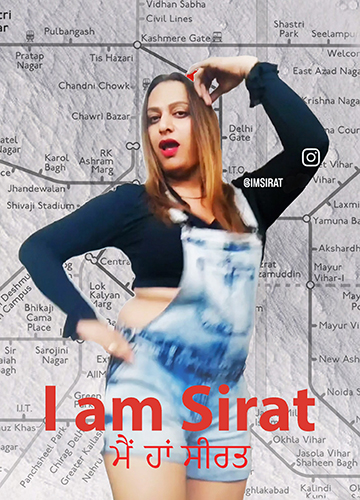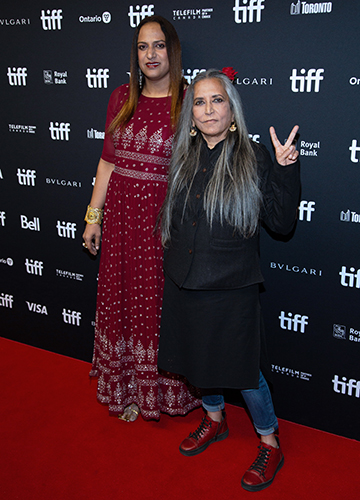Whether it is her elements trilogy or her last film, Funny Boy, Oscar-nominated filmmaker Deepa Mehta is not scared of touching the untouchable. The more provocative her subject, the more compassionate her treatment. The forbidden love of two women, the violence of a gang rape, the devastating consequences of partition―her stories are of hope in the midst of suffering, of perseverance in the face of pain. Her latest, I am Sirat, is no different. The story of a trans woman who lives a dual life, I am Sirat captures the conflict in Sirat’s mind, while not letting go of her joy and hunger for life. While the film premiered at the Toronto International Film Festival in 2023, it is being screened in India for the first time.
Mehta first met Sirat four years ago, during the filming of an episode of her drama series Leila, in which Sirat plays a transman. “I found her to be very daring and honest during the workshops,” says Mehta. “She was eager to learn. We kept in touch. Last year when we spoke, she called me ‘ma’ and asked me to make a film on her.”
Mehta says the central battle in Sirat’s life―between duty and self-determination―is one we are all, in some form or the other, familiar with. Sirat lives a double life in the chaotic streets of Delhi’s Tilak Nagar: as her mother’s son Aman when at home, but as the woman she is at heart while at her government job or while partying with her friends. Belonging to a Sikh family, she covers her head to hide her long hair from her mother, who refuses to accept her identity as Sirat. On her way to work, she stops at her one-room rented house where she transforms into Sirat―padding her bosom with double bras, letting her hair loose, applying makeup, and shooting a quick reel on Instagram―before stepping out.
It is the reels which inspired Mehta to let go of the film’s creative control. As a result, the entire documentary is shot using phones, often through Sirat’s own reels, which Mehta felt, gave Sirat the freedom to be herself. “The idea to shoot on cellphones―Sirat shooting her narrative arc vertically and me filming her horizontally while she did so―was based on pure logic,” Mehta tells THE WEEK. “To have a whole film crew would have been invasive of Sirat’s privacy and might have inhibited her.”
As the world stifles her with its strict social mores, Sirat finds freedom in her rented home, where she dresses up, dances and sings to herself. She cries when she receives her transgender identity card after running from pillar to post for it. “I feel like I have been reborn,” she says, proudly displaying it.
Just like how Sirat uses Instagram reels to express her feelings, Mehta uses songs in the film. “Music through Insta reels plays an integral role in Sirat’s life,” she says. “She uses the lyrics to express the joy, pain and ambiguity of her life.” The film ends with Sirat, with her eyes shining with hope, letting her hair down as she croons Faiz Ahmad Faiz’s ‘Hum Dekhengey’. In doing so, she sheds her identity as Aman and becomes whole as Sirat. “Sirat had asked me what song, for me, conveyed hope in adverse circumstances. I told her it was ‘Hum Dekhenge’. She proceeded to learn and use it,” says Mehta.
Like in her other movies, Mehta brings out the universal through the specific, commenting on the sad state of transgender persons in the country who remain marginalised and are forced into begging and prostitution. “I am attracted to subjects that make me curious,” says Mehta. “When I made Fire (1996), it was not about the LGBTQ community or of two women falling in love, but about the emotional arc becoming physical and who judges it, where do misogyny and patriarchy stand in it? Self-determination in women is always interpreted as selfishness. And so, coming back with Sirat’s story was like completing a full circle.”
When Mehta reunited with Nandita Das (one of the protagonists of Fire) at the 15th edition of the Kashish Pride Film Festival recently in Mumbai, they spoke about the evolution of LGBTQ+ representation in cinema. “Fire sparked a crucial conversation about LGBTQ+ issues at a time when such dialogue was virtually non-existent,” said Das. “Revisiting this journey was profoundly moving. It reminded me of the power of cinema in driving social change and the importance of continuing this advocacy.”
According to Mehta, freedom of expression is one of the most vital tools we have as a society. It is essential for growth. But like anything worth fighting for, it has its challenges. Mehta is now working on a biographical film based on Forgiveness, a memoir by Mark Sakamoto, and will then focus on Troilokya, about an Indian woman known to be a serial killer.
Her film Funny Boy (2020), a love story set amidst political tensions in Sri Lanka, became a Netflix hit in other countries, but not in India. Even while dealing with themes like love and longing, she stands by what Toni Morrison once said, that “all art is political”, and what is political today may not have been 10 years ago. Even in that, perhaps, there is hope. In a world that is fast changing, perhaps the unacceptable―like a trans woman finding joy in something the rest of us take for granted: her identity―will become accepted. Until then, there will always be those like Mehta to tell their stories.




